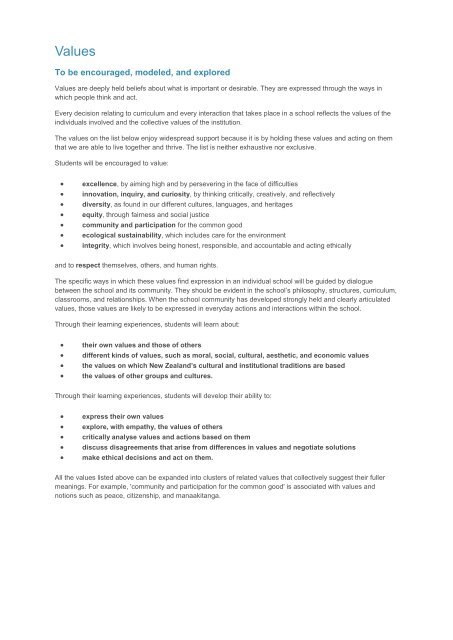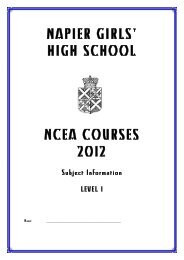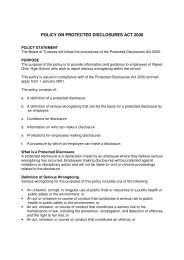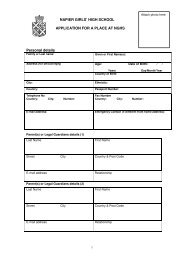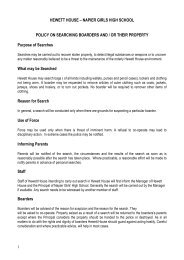ValuesTo be encouraged, modeled, and exploredValues are deeply held beliefs about what is important or desirable. <strong>The</strong>y are expressed through the ways inwhich people think and act.Every decision relating to curriculum and every interaction that takes place in a school reflects the values of theindividuals involved and the collective values of the institution.<strong>The</strong> values on the list below enjoy widespread support because it is by holding these values and acting on themthat we are able to live together and thrive. <strong>The</strong> list is neither exhaustive nor exclusive.Students will be encouraged to value:excellence, by aiming high and by persevering in the face of difficultiesinnovation, inquiry, and curiosity, by thinking critically, creatively, and reflectivelydiversity, as found in our different cultures, languages, and heritagesequity, through fairness and social justicecommunity and participation for the common goodecological sustainability, which includes care for the environmentintegrity, which involves being honest, responsible, and accountable and acting ethicallyand to respect themselves, others, and human rights.<strong>The</strong> specific ways in which these values find expression in an individual school will be guided by dialoguebetween the school and its community. <strong>The</strong>y should be evident in the school’s philosophy, structures, curriculum,classrooms, and relationships. When the school community has developed strongly held and clearly articulatedvalues, those values are likely to be expressed in everyday actions and interactions within the school.Through their learning experiences, students will learn about:their own values and those of othersdifferent kinds of values, such as moral, social, cultural, aesthetic, and economic valuesthe values on which <strong>New</strong> <strong>Zealand</strong>’s cultural and institutional traditions are basedthe values of other groups and cultures.Through their learning experiences, students will develop their ability to:express their own valuesexplore, with empathy, the values of otherscritically analyse values and actions based on themdiscuss disagreements that arise from differences in values and negotiate solutionsmake ethical decisions and act on them.All the values listed above can be expanded into clusters of related values that collectively suggest their fullermeanings. For example, 'community and participation for the common good' is associated with values andnotions such as peace, citizenship, and manaakitanga.
Key CompetenciesCapabilities for living and lifelong learning<strong>The</strong> <strong>New</strong> <strong>Zealand</strong> <strong>Curriculum</strong> identifies five key competencies:thinkingusing language, symbols, and textsmanaging selfrelating to othersparticipating and contributingPeople use these competencies to live, learn, work, and contribute as active members of their communities. Morecomplex than skills, the competencies draw also on knowledge, attitudes, and values in ways that lead to action.<strong>The</strong>y are not separate or stand-alone. <strong>The</strong>y are the key to learning in every learning area.<strong>The</strong> development of the competencies is both an end in itself (a goal) and the means by which other ends areachieved. Successful learners make use of the competencies in combination with all the other resourcesavailable to them. <strong>The</strong>se include personal goals, other people, community knowledge and values, cultural tools(language, symbols, and texts), and the knowledge and skills found in different learning areas. As they developthe competencies, successful learners are also motivated to use them, recognising when and how to do so andwhy.Opportunities to develop the competencies occur in social contexts. People adopt and adapt practices that theysee used and valued by those closest to them, and they make these practices part of their own identity andexpertise.<strong>The</strong> competencies continue to develop over time, shaped by interactions with people, places, ideas, and things.Students need to be challenged and supported to develop them in contexts that are increasingly wide-rangingand complex.ThinkingThinking is about using creative, critical, and metacognitive processes to make sense of information,experiences, and ideas. <strong>The</strong>se processes can be applied to purposes such as developing understanding, makingdecisions, shaping actions, or constructing knowledge. Intellectual curiosity is at the heart of this competency.Students who are competent thinkers and problem-solvers actively seek, use, and create knowledge. <strong>The</strong>y reflecton their own learning, draw on personal knowledge and intuitions, ask questions, and challenge the basis ofassumptions and perceptions.Using language, symbols, and textsUsing language, symbols, and texts is about working with and making meaning of the codes in which knowledgeis expressed. Languages and symbols are systems for representing and communicating information,experiences, and ideas. People use languages and symbols to produce texts of all kinds: written, oral/aural, andvisual; informative and imaginative; informal and formal; mathematical, scientific, and technological.Students who are competent users of language, symbols, and texts can interpret and use words, number,images, movement, metaphor, and technologies in a range of contexts. <strong>The</strong>y recognise how choices of language,symbol, or text affect people’s understanding and the ways in which they respond to communications. <strong>The</strong>yconfidently use ICT (including, where appropriate, assistive technologies) to access and provide information andto communicate with others.Managing selfThis competency is associated with self-motivation, a “can-do” attitude, and with students seeing themselves ascapable learners. It is integral to self-assessment.


